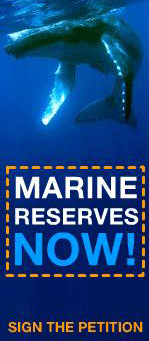What You Can Do
We can all act to protect our oceans from overfishing, and from destructive fishing and farming practices by carefully choosing the seafood we buy.

If you are a consumer then, you can do this:
- Avoid species that appear on a Greenpeace seafood red list
These are species that are commonly sold in supermarkets and that have a high risk of being unsustainable. Choosing other species can help take the pressure off the more popular species. - Buy from supermarkets that have, or are developing, sustainable seafood policies.
This will give you more chance of choosing more sustainable seafood products. Check out your national Greenpeace website to find out if your supermarket has been scored on its seafood sourcing policy. Also check the supermarket's website to find out if it has a policy. - Check the product label for the name, origin and fishing method of seafood you wish to buy.
If it's not properly labelled, ask for information from the fish counter or store assistants. Don't buy seafood if you don't know where it is from. As a general rule, try to choose local species caught by lines, pots or traps. For oily fish such as sardines, herring, and anchovy, those caught in purse seine nets can be the best choice. - Spread the message about sustainable seafood.
Talk to your friends and colleagues and ask them to start thinking about sustainability when they buy seafood. - Support the development of a network of marine reserves to help protect ocean life.
Encourage change by talking to politicians who represent you, and by support organisations that advocate marine reserves.
If you are a retailer then, you can do this:
- Stop selling species that appear on a Greenpeace seafood red list.
If you have found a sustainable source of one of the species on the red list, ensure that it is clearly labelled, and information about its sustainability can be checked and confirmed easily. - Tell your customers that seafood sustainability is important to you.
Make sure your sustainable seafood policy is accessible to your customers in your stores and online. Promote the more sustainable seafood you sell - Label all seafood clearly with the species name, origin and fishing method.
If this is not possible, ensure that this information is readily available to customers in the store and online. - Ask your suppliers for sustainable seafood.
Ensure that your suppliers provide full traceability of their products as a minimum requirement. - Support the development of a network of marine reserves to help protect ocean life.
Encourage change by talking to politicians who represent you, and by support organisations that advocate marine reserves.





